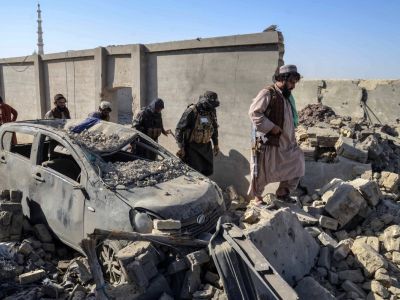Iran's oil production fell to 3.45 million barrels per day (bpd) in October, the lowest monthly figure so far this year, the Middle East Economic Survey (MEES) reported Saturday.
The Nicosia-based newsletter quoted sources as indicating crude exports totaled 2.00 million bpd with 1.45 million bpd delivered to domestic refineries.
This compares with 3.62 million bpd in September.
MEES noted that the October production was very close to Iran's OPEC production quota of 3.406 million bpd. Tehran is frequently charged with over-producing on its quota within the cartel.
The country's Oil Minister Bijan Namdar Zangeneh called Saturday on non-OPEC oil producers to "negotiate and cooperate" to cut world production of crude and "avoid a collapse in prices in the months to come."
"OPEC has no other tool than to convince non-OPEC countries to cut production and thereby avoid a collapse in prices, particularly in the second half of 2002," he added in a statement on Iranian radio, adding that OPEC had negotiations with Norway, Russia, Angola, Oman and Mexico.
He said "prices will collapse if nothing is done to decide on a total reduction of two million barrels per day."
OPEC ministers on Wednesday agreed to cut their production by 1.5 million bpd from January 1, on condition that major non-OPEC producers like Russia, Norway and Mexico cut by half a million bpd.
Mexico announced late Wednesday that it will cut oil exports "up to 100,000 barrels a day" from January 1, if OPEC confirmed its conditional cut.
But Russia reiterated Friday that no one could tell it how much oil to export.
After falling some 15 percent already this week, London Brent crude for January delivery was down another two cents on Friday at 17.31 dollars a barrel.
On Thursday the price fell below 17 dollars a barrel for the first time since June 1999.
In New York, December-dated light sweet crude lost early gains to stand at its overnight level of 17.45 dollars a barrel.
Oil prices have fallen dramatically as major world crude producers have chosen to chase market share rather than price stability at a time when a supply glut is swamping a market undermined by falling demand.
Budgets in Moscow and Riyadh both depend on crude prices remaining at a certain level, and most analysts believe that Russia can live with lower oil prices longer than Saudi Arabia.
For Iran, the world's second largest producer in OPEC after Saudi Arabia, the 2001/2002 budget is based on an oil price of around 20 dollars per barrel -- NICOSIA, Nov 17 (AFP) -
© 2001 Al Bawaba (www.albawaba.com)









